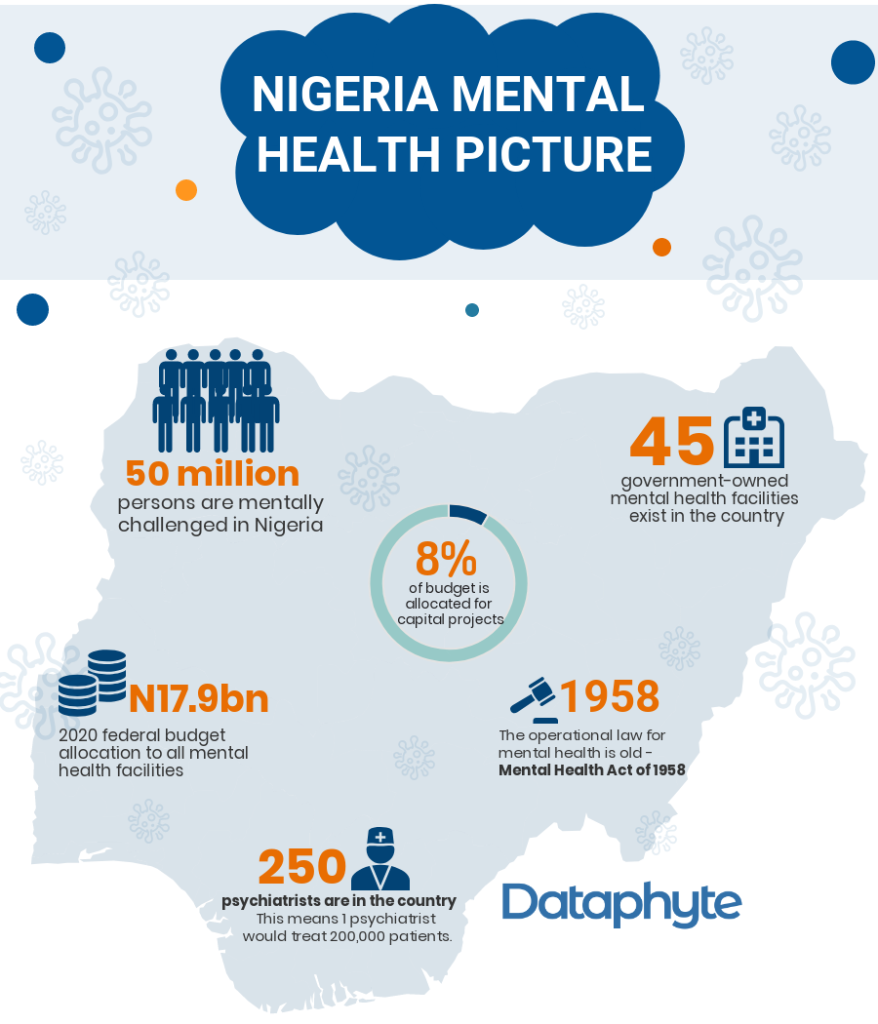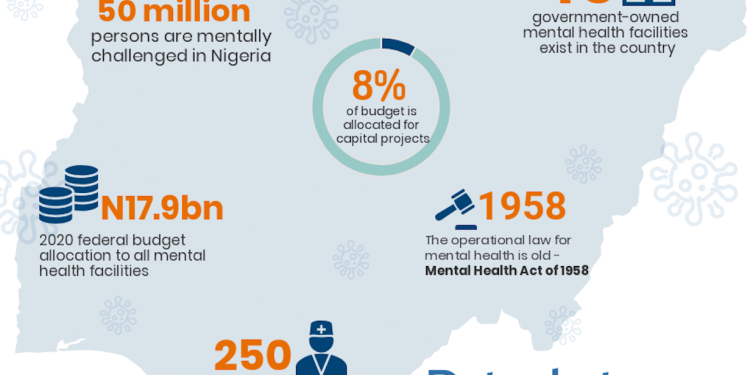Most Nigerians have a superficial perception of mental health. The majority consider mental disorders as physical manifestations of violence and extreme irrational behaviour. They less understand it as a mental condition that may affect only the mood or an individual. Or the thinking process and behaviour of a person. This uneducated outlook poses the first and major barrier to diagnosis and therapy.
A recent study by the African Polling Institute (API) indicated that public perception about mental health in Nigeria is still significantly poor. Mental health disorders are still commonly connected with its overt psychosocial symptoms without attending to the secret slippery triggers like stress, depression or trauma. According to the API study, about 35% of Nigerians will not refer to a mentally disturbed person to a hospital. A considerable number would rather resort to prayer houses and unorthodox rehabilitation centres, where they impose unhealthy restraints on the victim. Some Nigerians even believe that all mental health disorders cannot be successfully treated medically.
Data from the World Health Organization (WHO) captures the grim state of mental health in Nigeria. WHO notes that one in four persons living in Nigeria, that is, about 50 million people suffer from some form of mental disorder. On the global scale, Nigeria has Africa’s highest caseload of depression and ranks 15th in the frequency of suicide in the world.
Despite these huge number of mental health cases in the country, Nigeria can only boast of 250 psychiatrists and another 200 psychiatry trainees in its 45 government-owned mental health facilities scattered across the country. If the available 250 psychiatrists are spread evenly over the 45 mental health facilities to treat 50 million people currently with mental ailments in the country, each facility will have 6 psychiatrists to attend to at least 1.1 million waiting patients! This shortage of mental health personnel is the second limitation against anyone who struggles with some mental condition in Nigeria.
The scarcity of psychiatrists is a corollary of the gross shortages in the number of facilities for them to practice. Going by the huge costs of qualifying as a specialist in psychiatry, no one wants to graduate with little or no place for them to work.
A recent investigative foray into the mental health realities in Nigeria highlights Nigeria’s gross policy and practice deficits in mental health care delivery. Fisayo Soyombo’s undercover investigation on the Federal Neuropsychiatric Hospital, Yaba, Lagos provides valuable insights into the multivariate causes of increasing mental struggles of the average Nigerian.
The report revealed considerable deterioration of the sampled mental health facility, lack of bed space for patients who clearly need to be admitted, a very unprofessional disposition amongst the staff, poor food and environmental hygiene, and a general depressing picture of the mental health facility. Soyombo’s exposition also raises questions on the amount and proportion of Nigeria’s health budget for mental care and the actual disbursements eventually released to mental health facilities.
As the federal budget to the healthcare sector in Nigeria, the allocation to the mental health facilities is poor. For example, less than 18 billion naira is allocated to the eight federal facilities in the country. Moreso, only eight percent (1.52 billion naira) of this allocation is meant for capital projects. Several other reports warn of an emerging mental catastrophe in the country, with many Nigerians living with utter hopelessness, fear, trauma and angst, as a result of actual or imminent exposure to recurring religious, ethnic, State and economic violence such as bombings, beheadings, maiming, killings, kidnapping, daily extortion and extrajudicial killings by the police, the State’s arbitrary arrest and incarceration of people, merchandise of justice at the courts, unresolved murders, armed robbery, homeless people fleeing ethnic genocide, jobless youths, job losses by middle-aged persons, dependent senior citizens, widowhood, divorce, single parenting, disturbed adolescents, and the increasing tendency of suffering psyches to resort to unprescribed drugs for escape.
Several other reports warn of an emerging mental catastrophe in the country, with many Nigerians living with utter hopelessness, fear, trauma and angst, as a result of actual or imminent exposure to recurring religious, ethnic, State and economic violence such as bombings, beheadings, maiming, killings, kidnapping, daily extortion and extrajudicial killings by the police, the State’s arbitrary arrest and incarceration of people, merchandise of justice at the courts, unresolved murders, armed robbery, homeless people fleeing ethnic genocide, jobless youths, job losses by middle-aged persons, dependent senior citizens, widowhood, divorce, single parenting, disturbed adolescents, and the increasing tendency of suffering psyches to resort to unprescribed drugs for escape.
Despite myriads of reports on increasing exposure of Nigerians to multidimensional violence, there is a puzzling indifference by their Government Representatives at the state and federal levels towards resolving the public causes of these human violations and their consequences for mental health.
This irresponsible attitude of indifference by the government also forecloses any sound legislative deliberation to repeal or amend existing related Acts such as the Mental Health Act of 1958 or to make new laws that cater for the varying levels of mental struggles
Nigeria’s current mental health statistics also indicate that executive governments at the state and federal levels still lack the sense of urgency to prioritise mental health care in the implementation of the National Health Policy of 2016. This is the main reason why there is no help from the public hospitals for the majority of citizens who are fighting within to remain sane, and for those who eventually lost it.



